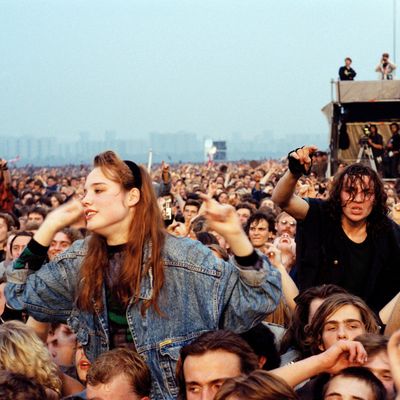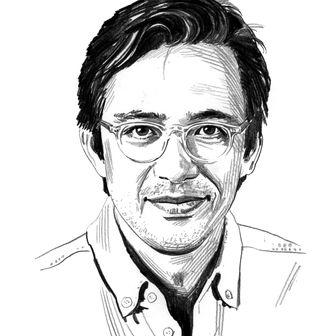
McDonald’s announced this week that it would cease operations in Russia as part of a global push to isolate Vladimir Putin’s government. The news was met with dismay by those who recalled when the Golden Arches first arrived in Moscow in 1990, a gleaming harbinger of a new and more hopeful era. “I remember when this McDonald’s opened and driving by, nose pressed against the glass, looking at the long, long lines, wrapping around the block,” wrote Puck’s Julia Ioffe. A contemporaneous account in the Washington Post described the inaugural franchise in Pushkin Square as a “splash of brilliant color in the middle of a gray city” and a “gastronomic-cum-cultural revolution in the homeland of scientific communism.”
As the post-Soviet era seems to come to a close — with Starbucks and Coca-Cola joining McDonald’s in shutting down their businesses in Russia, the regime cracking down on the remnants of the country’s free press, and sanctions cinching around the economy like a noose — other artifacts of that false dawn are circulating on social media. Perhaps none are as arresting as an absolutely massive concert that Metallica headlined in Moscow in 1991, mere months before the official collapse of the Soviet Union.
The video, part of a concert documentary called For Those About to Rock: Monsters in Moscow, captures a nation in the flux of late perestroika. Red Army soldiers have been called in to do crowd control, clashing against a seething sea of concertgoers. The show’s organizers repeatedly come on stage to plead with the crowd to refrain from violence, lest the authorities shut it down. “Remember why we are here,” they say, “to celebrate our victory.” Yet there are also people in army uniforms enjoying the music along with everyone else, flashing devil horns and lolling their tongues as if they’re in need of an exorcism.
The bands that played that day included AC/DC, the Black Crowes, and Pantera. If you’re of a certain age and musical persuasion, it’s oddly touching to see Pantera’s Dimebag Darrell (RIP), replete with a razor-blade necklace, do a stink-face shredding thing on his guitar while lead singer Phil Anselmo screams, “We’re taking over the entire country!” (A riff on the line “We’re taking over this town” from the song “Cowboys From Hell.”) But nothing compares to Metallica galloping on stage, lithe and frizzy-haired, to open their set with “Enter Sandman,” a once ubiquitously annoying song that, in hindsight, was one of America’s most influential cultural exports of the time, inspiring a distinct look that inundated both Eastern Europe and high schools around the world: tattered jeans, greasy locks, black Metallica T-shirt. The response from the crowd in Moscow is joyous havoc, a catharsis years in the making.
We all know what happened in the decade that followed: the disaster of “shock therapy” economics, the plundering of Russian industry by a cabal of oligarchs, the rise of Putin. As sweet as that dvoini gamburger (double hamburger) may have tasted, the promise of western-style capitalism proved hollow. “What an incredibly happy time!” writes Svetlana Alexievich in Secondhand Time, her account of the Soviet Union’s dissolution and its tragic aftermath. “We believed that tomorrow, the very next day, would usher in freedom. That it would materialize out of nowhere, from the sheer force of our wishing.” But, she adds, “Freedom turned out to mean the rehabilitation of bourgeois existence … the freedom of Her Highness Consumption.” Metallica and Pantera, while being icons of rebellion and testosterone-driven creativity, were also mass bourgeois entertainment — products of the great capitalist conveyor belt to be consumed by bored kids like so many Big Macs.
Bourgeois comforts were not enough to sustain Russia, in Alexievich’s telling, especially when they were so meager compared to the insane riches that were being stolen by Russia’s one percent. A new idea of Russian self-worth was born out of this disillusionment — or rather an old idea, stretching back to the Soviet Union’s victory over Nazi Germany in World War II, encouraged by Putin’s regime and embraced by those inclined to look upon the days of Stalin with nostalgia. “In the past couple of decades, this war seems to have overshadowed all other historical events, becoming the single point of reference for Russian national identity,” Masha Gessen recently wrote for the New Yorker. This jingoistic mythmaking has served as a risible justification for Putin’s invasion of Ukraine, which he asserts is infested with neo-Nazi elements.
What is “Enter Sandman” compared to the heady claims of national glory? Or, for that matter, a genuinely fair and equal society, which is what Russians wanted and deserved? Not a lot. But it’s not nothing, either. The tolerance for certain rights and privileges, the prevalence of western products and services, the sense that Russia was connected to the wider world — these all surely made the Putin regime more bearable, and their sudden disappearance will be felt as an imposition. It’s worth remembering that while the sound of freedom is no doubt different for everyone, for those Muscovites in 1991, it was this: “Exit light! Enter night!”






























